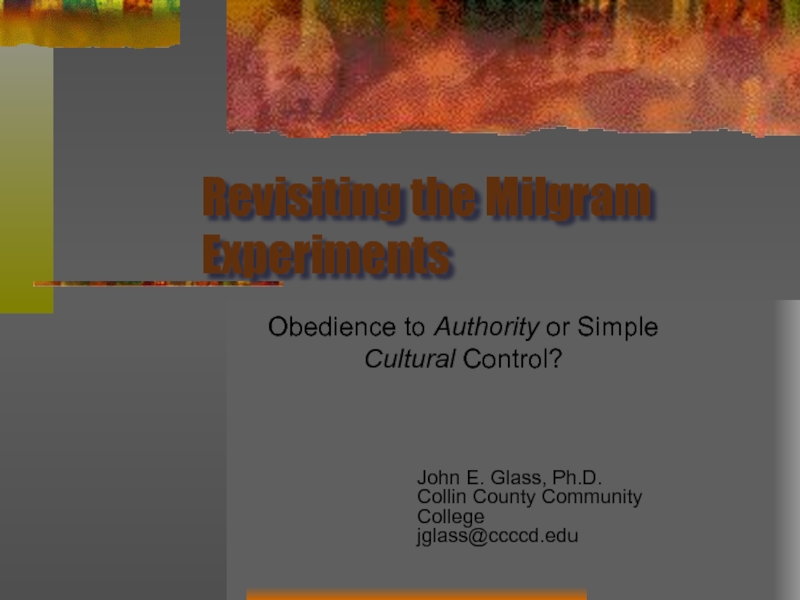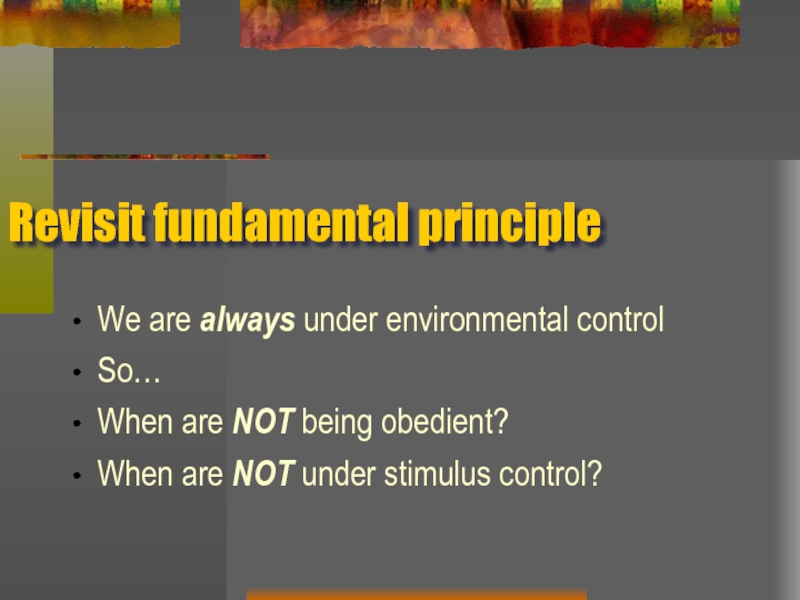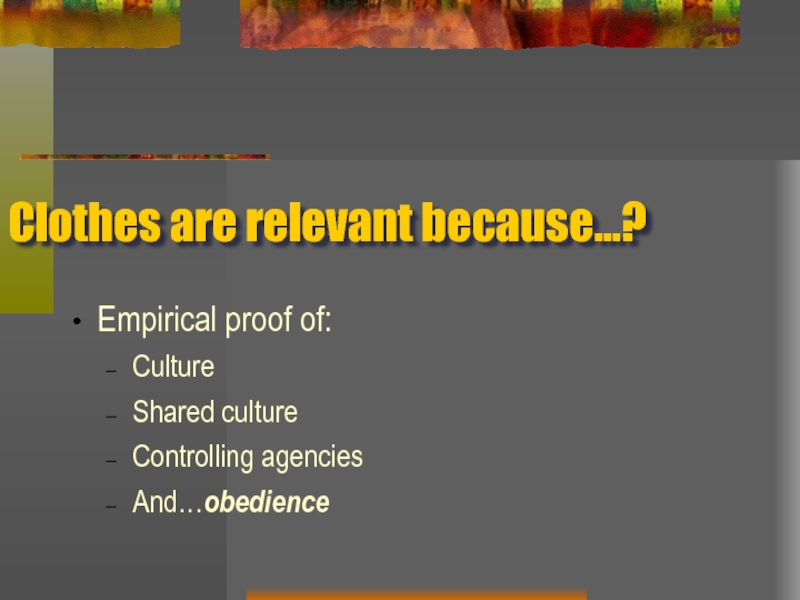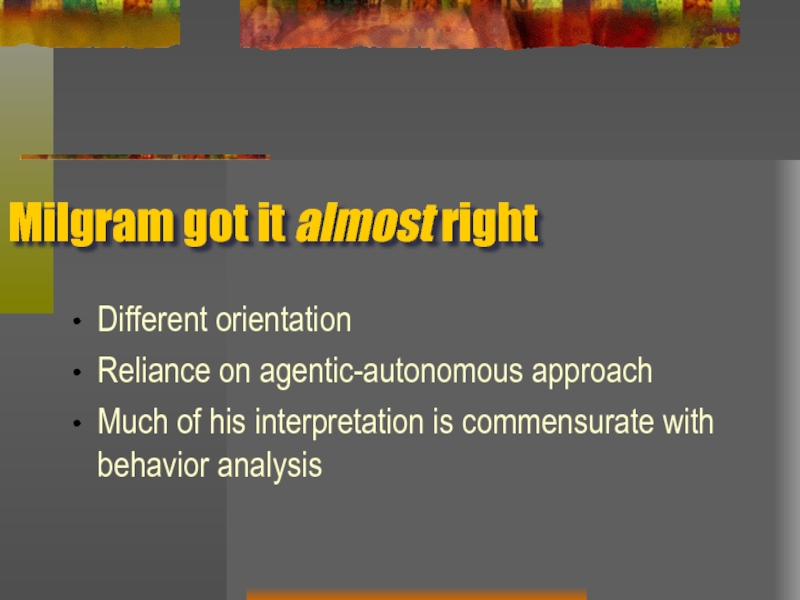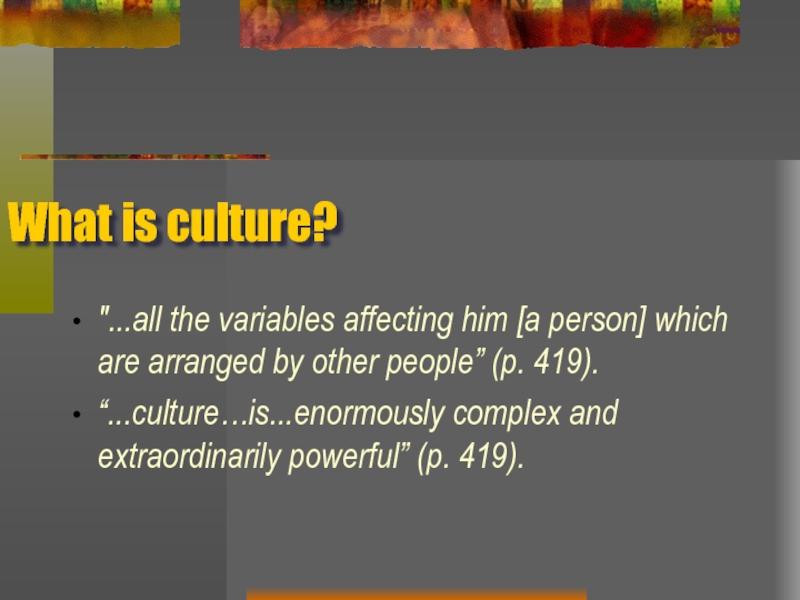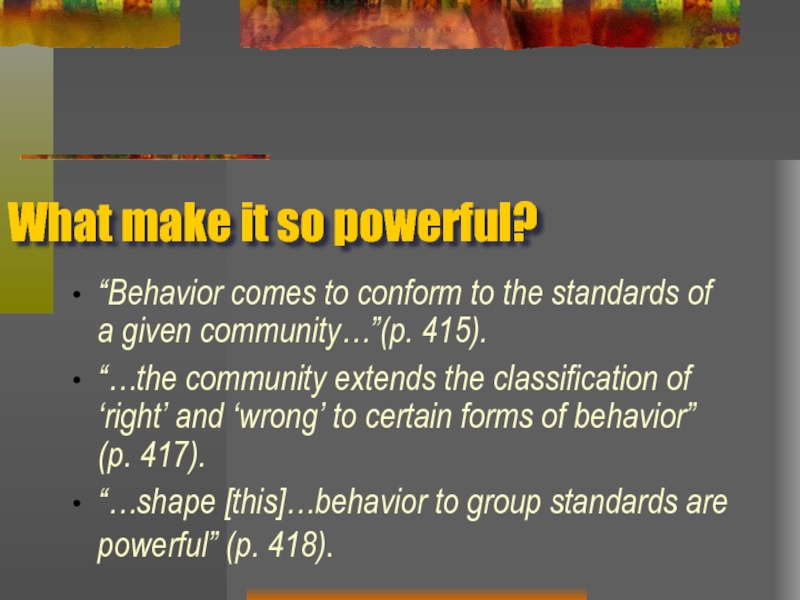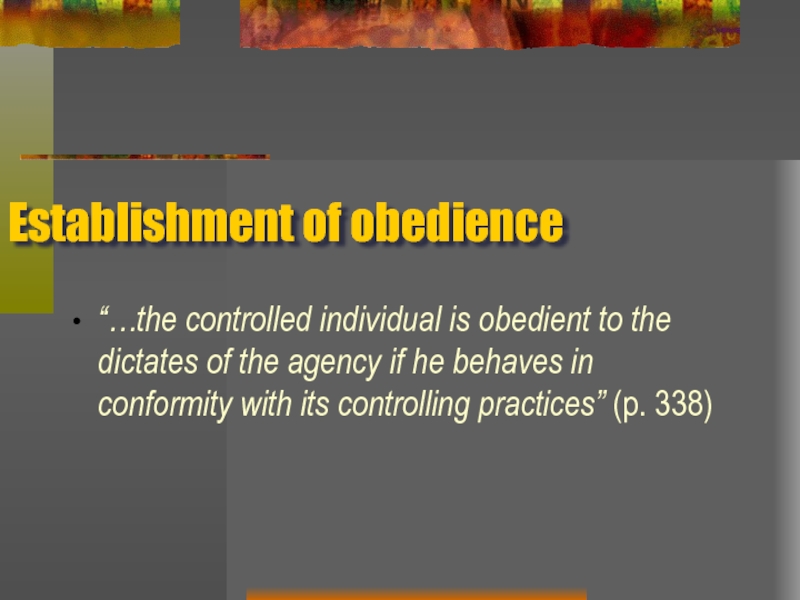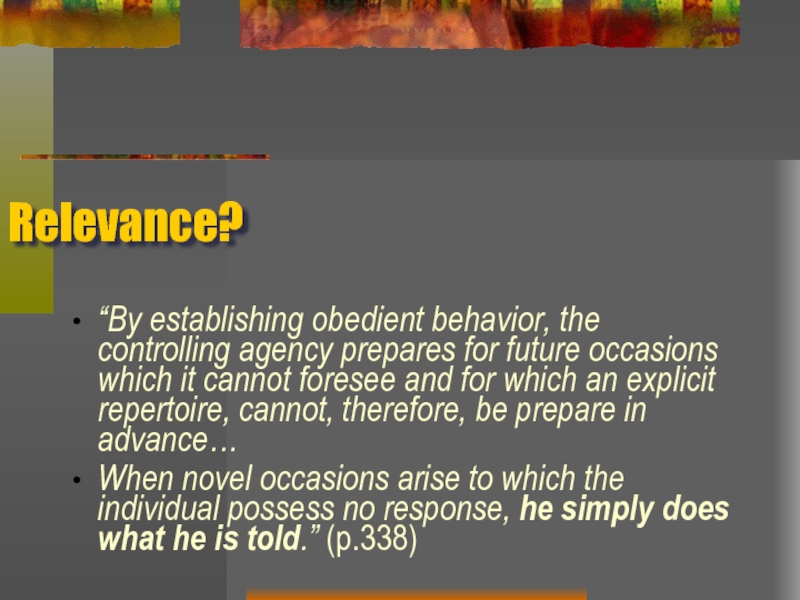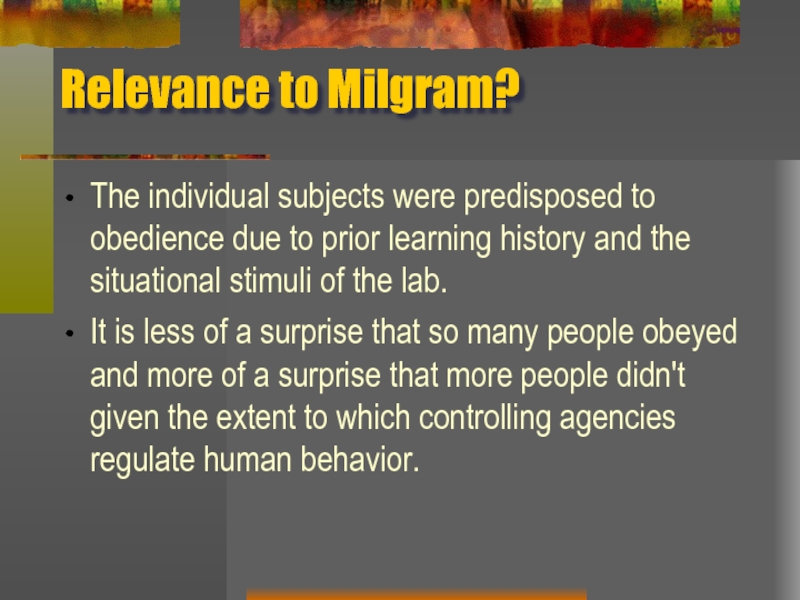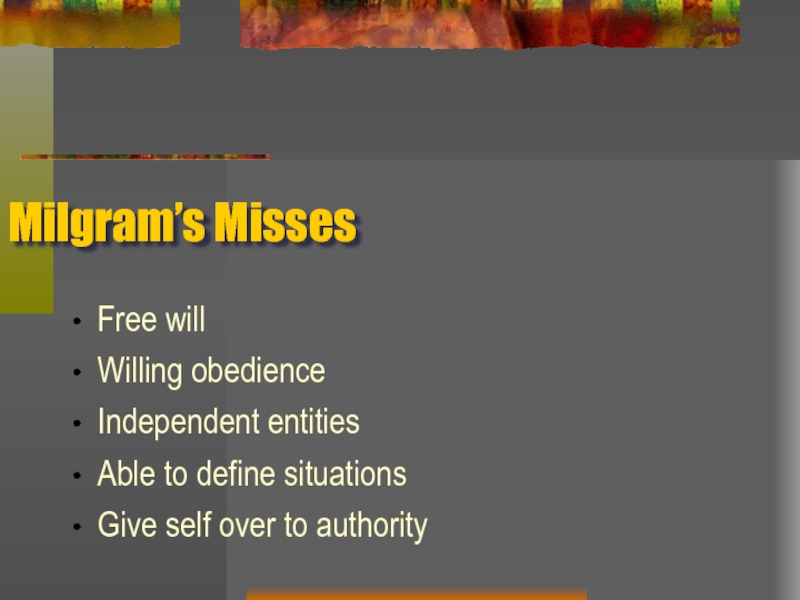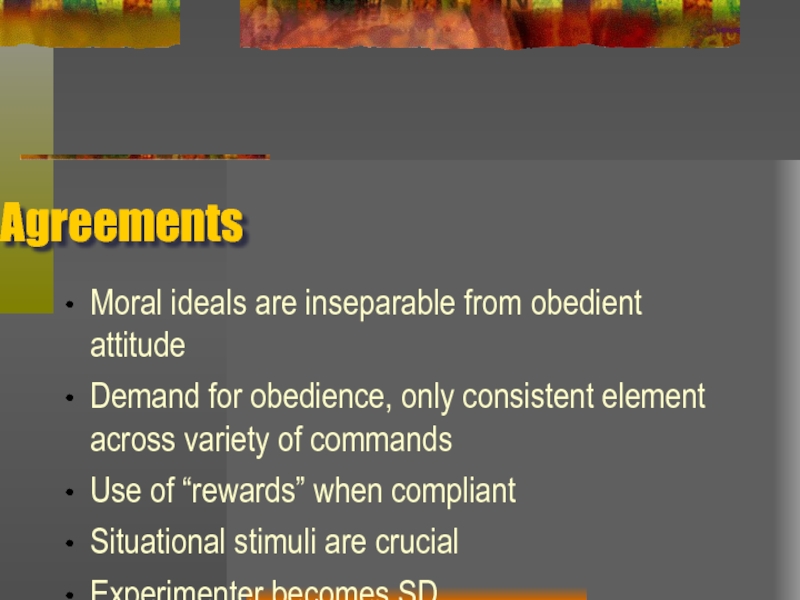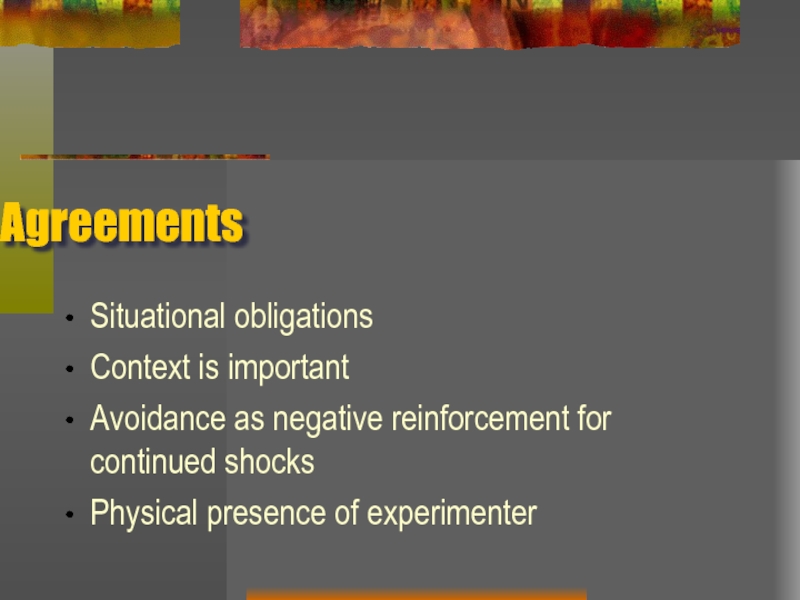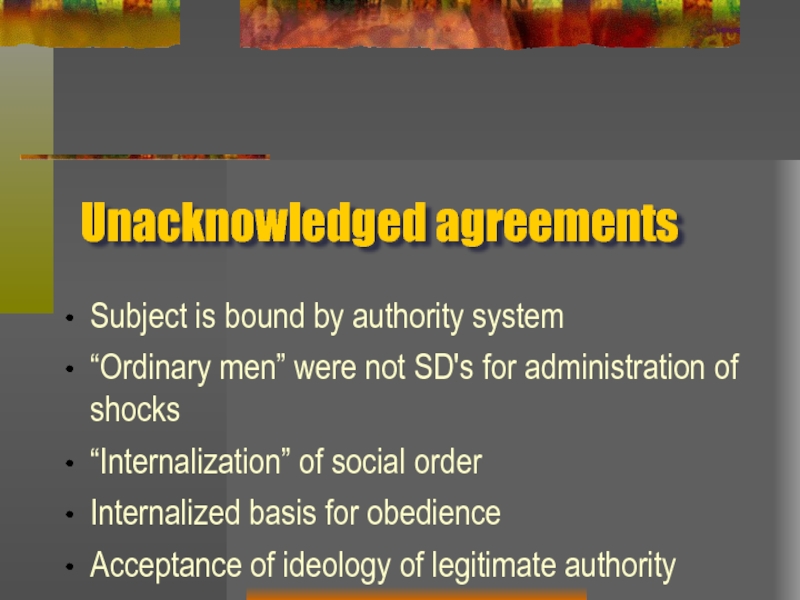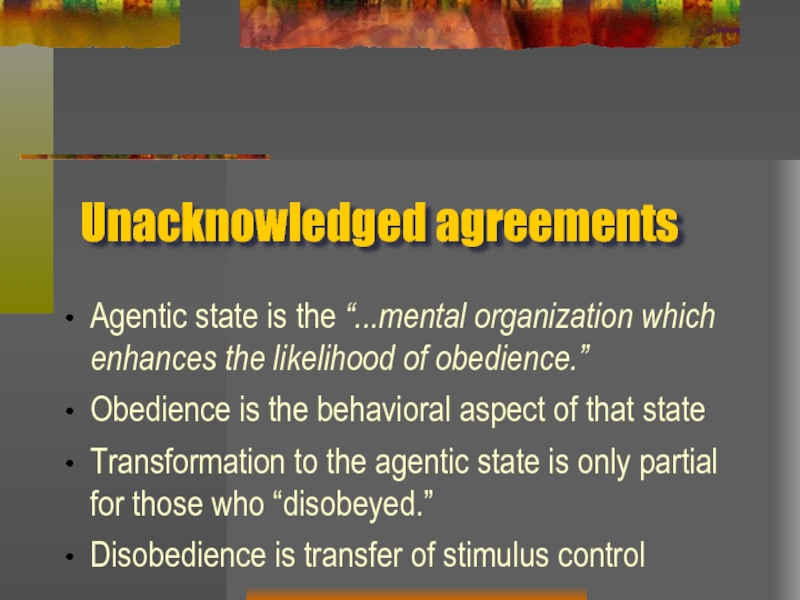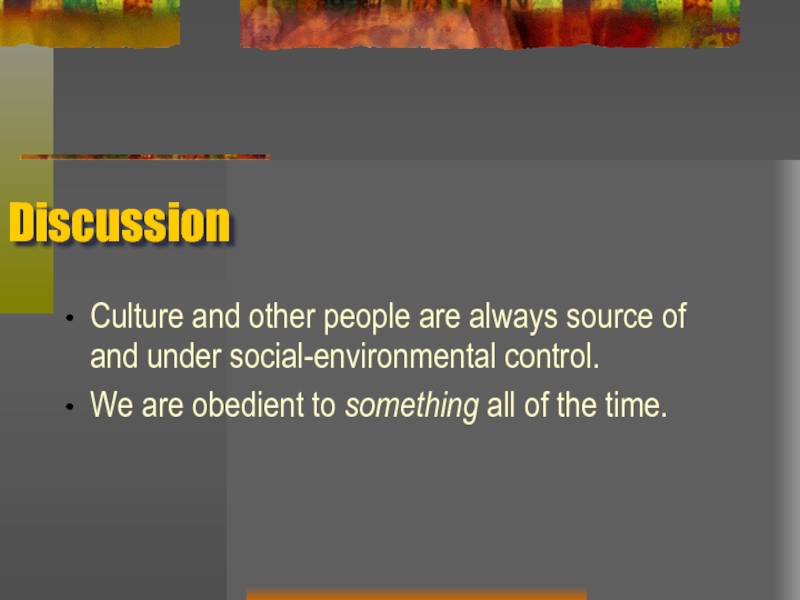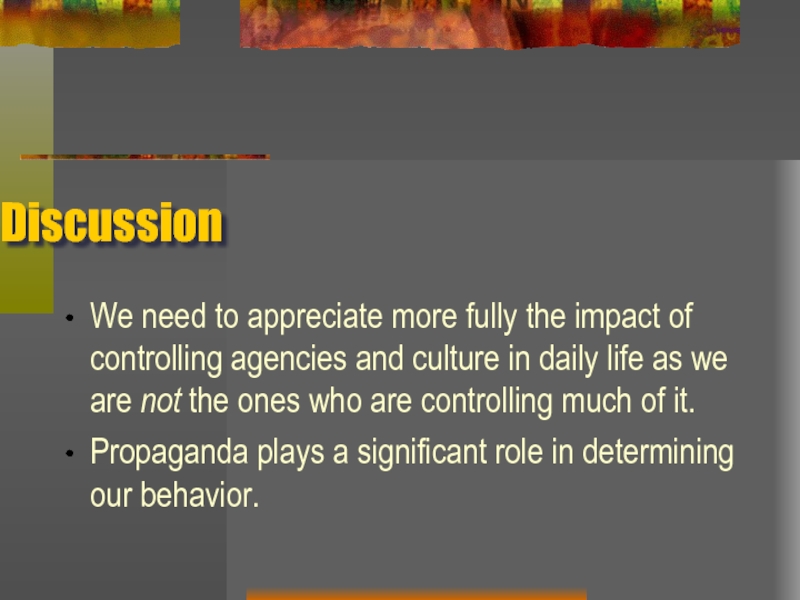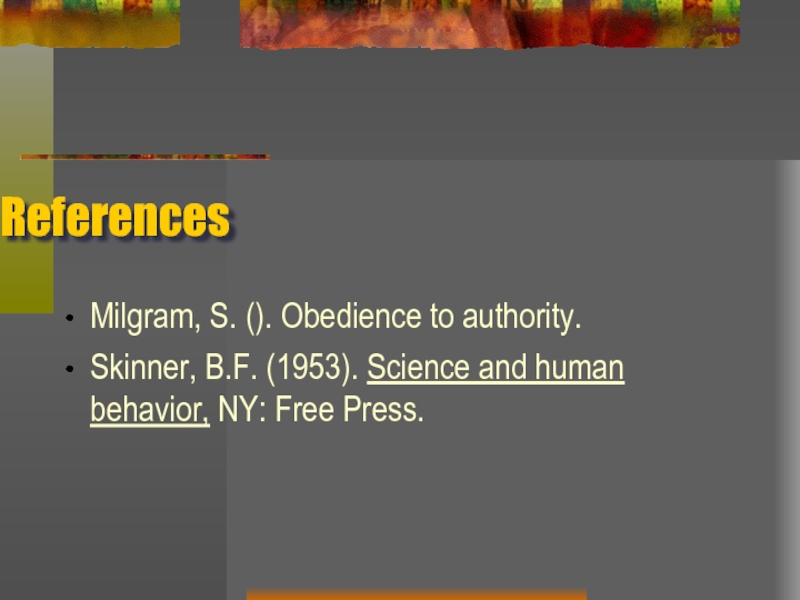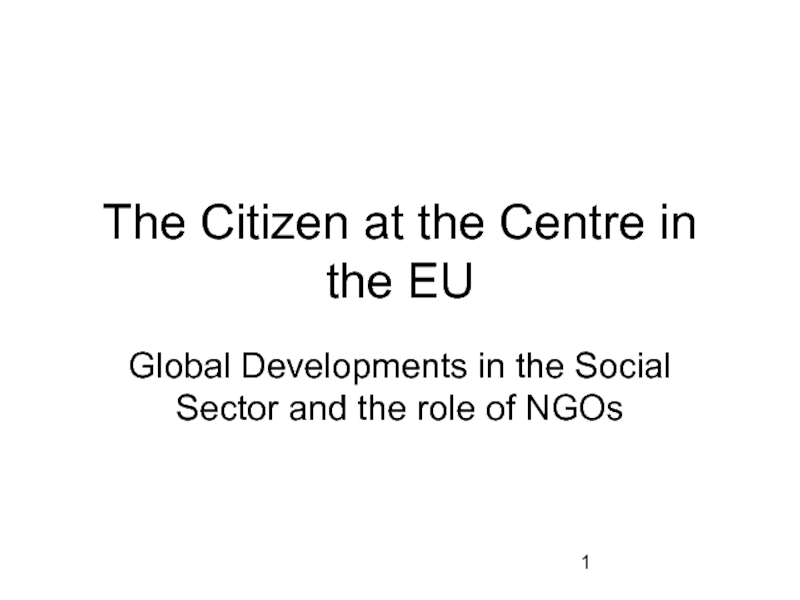Glass, Ph.D.
Collin County Community College
jglass@ccccd.edu
- Главная
- Разное
- Дизайн
- Бизнес и предпринимательство
- Аналитика
- Образование
- Развлечения
- Красота и здоровье
- Финансы
- Государство
- Путешествия
- Спорт
- Недвижимость
- Армия
- Графика
- Культурология
- Еда и кулинария
- Лингвистика
- Английский язык
- Астрономия
- Алгебра
- Биология
- География
- Детские презентации
- Информатика
- История
- Литература
- Маркетинг
- Математика
- Медицина
- Менеджмент
- Музыка
- МХК
- Немецкий язык
- ОБЖ
- Обществознание
- Окружающий мир
- Педагогика
- Русский язык
- Технология
- Физика
- Философия
- Химия
- Шаблоны, картинки для презентаций
- Экология
- Экономика
- Юриспруденция
Revisiting the Milgram Experiments презентация
Содержание
- 1. Revisiting the Milgram Experiments
- 2. Revisit fundamental principle We are always under
- 3. Observable, tangible evidence Clothes Are you wearing any? Why? For their function? For their style?
- 4. Clothes are relevant because…? Empirical proof of: Culture Shared culture Controlling agencies And…obedience
- 5. Milgram got it almost right Different orientation
- 6. What is culture? "...all the variables affecting
- 7. What make it so powerful? “Behavior comes
- 8. Relevance? “’Right’ and ‘wrong’ eventually have the
- 9. Cultural control “...social stimuli are important because
- 10. Controlling agencies Government and Law Religion Psychotherapy Economic Control Education
- 11. Characteristics of controlling agencies “...controlling agencies manipulate
- 12. Establishment of obedience “…the controlled individual is
- 13. Relevance? “By establishing obedient behavior, the controlling
- 14. Relevance to Milgram? The individual subjects were
- 15. Relevance to Milgram? Those that dissented and
- 16. Milgram’s Misses Free will Willing obedience Independent
- 17. Agreements Moral ideals are inseparable from obedient
- 18. Agreements Situational obligations Context is important Avoidance
- 19. Unacknowledged agreements Subject is bound by authority
- 20. Unacknowledged agreements Agentic state is the “...mental
- 21. Discussion Culture and other people are always
- 22. Discussion We need to appreciate more fully
- 23. Real question is... Not necessarily who is
- 24. References Milgram, S. (). Obedience to authority.
Слайд 2Revisit fundamental principle
We are always under environmental control
So…
When are NOT being
obedient?
When are NOT under stimulus control?
When are NOT under stimulus control?
Слайд 3Observable, tangible evidence
Clothes
Are you wearing any?
Why?
For their function?
For their style?
Слайд 4Clothes are relevant because…?
Empirical proof of:
Culture
Shared culture
Controlling agencies
And…obedience
Слайд 5Milgram got it almost right
Different orientation
Reliance on agentic-autonomous approach
Much of his
interpretation is commensurate with behavior analysis
Слайд 6What is culture?
"...all the variables affecting him [a person] which are
arranged by other people” (p. 419).
“...culture…is...enormously complex and extraordinarily powerful” (p. 419).
“...culture…is...enormously complex and extraordinarily powerful” (p. 419).
Слайд 7What make it so powerful?
“Behavior comes to conform to the standards
of a given community…”(p. 415).
“…the community extends the classification of ‘right’ and ‘wrong’ to certain forms of behavior” (p. 417).
“…shape [this]…behavior to group standards are powerful” (p. 418).
“…the community extends the classification of ‘right’ and ‘wrong’ to certain forms of behavior” (p. 417).
“…shape [this]…behavior to group standards are powerful” (p. 418).
Слайд 8Relevance?
“’Right’ and ‘wrong’ eventually have the force of ‘conforming’ and ‘non-conforming’”
(p. 418).
“Instances of behavior which are nonconforming, but not otherwise aversive to the group are henceforth treated as if they were aversive” (p. 418).
“Instances of behavior which are nonconforming, but not otherwise aversive to the group are henceforth treated as if they were aversive” (p. 418).
Слайд 9Cultural control
“...social stimuli are important because the social reinforcers with which
they are correlated are also important” (p.302)
“...imitation may be so skillful...that we are likely to attribute it to some special mode of interpersonal contact...(p. 304).
“...imitation may be so skillful...that we are likely to attribute it to some special mode of interpersonal contact...(p. 304).
Слайд 11Characteristics of controlling agencies
“...controlling agencies manipulate particular sets of variables (p.
333)”
“...the total culture, in which all our controlling agencies and all other features of the social environment work together simultaneously and with a single effect (p. 334).”
“...the total culture, in which all our controlling agencies and all other features of the social environment work together simultaneously and with a single effect (p. 334).”
Слайд 12Establishment of obedience
“…the controlled individual is obedient to the dictates of
the agency if he behaves in conformity with its controlling practices” (p. 338)
Слайд 13Relevance?
“By establishing obedient behavior, the controlling agency prepares for future occasions
which it cannot foresee and for which an explicit repertoire, cannot, therefore, be prepare in advance…
When novel occasions arise to which the individual possess no response, he simply does what he is told.” (p.338)
When novel occasions arise to which the individual possess no response, he simply does what he is told.” (p.338)
Слайд 14Relevance to Milgram?
The individual subjects were predisposed to obedience due to
prior learning history and the situational stimuli of the lab.
It is less of a surprise that so many people obeyed and more of a surprise that more people didn't given the extent to which controlling agencies regulate human behavior.
It is less of a surprise that so many people obeyed and more of a surprise that more people didn't given the extent to which controlling agencies regulate human behavior.
Слайд 15Relevance to Milgram?
Those that dissented and disobeyed did so because of
the control of some agency, because it is not possible to do so otherwise.
Слайд 16Milgram’s Misses
Free will
Willing obedience
Independent entities
Able to define situations
Give self over to
authority
Слайд 17Agreements
Moral ideals are inseparable from obedient attitude
Demand for obedience, only consistent
element across variety of commands
Use of “rewards” when compliant
Situational stimuli are crucial
Experimenter becomes SD
Use of “rewards” when compliant
Situational stimuli are crucial
Experimenter becomes SD
Слайд 18Agreements
Situational obligations
Context is important
Avoidance as negative reinforcement for continued shocks
Physical presence
of experimenter
Слайд 19Unacknowledged agreements
Subject is bound by authority system
“Ordinary men” were not SD's
for administration of shocks
“Internalization” of social order
Internalized basis for obedience
Acceptance of ideology of legitimate authority
“Internalization” of social order
Internalized basis for obedience
Acceptance of ideology of legitimate authority
Слайд 20Unacknowledged agreements
Agentic state is the “...mental organization which enhances the likelihood
of obedience.”
Obedience is the behavioral aspect of that state
Transformation to the agentic state is only partial for those who “disobeyed.”
Disobedience is transfer of stimulus control
Obedience is the behavioral aspect of that state
Transformation to the agentic state is only partial for those who “disobeyed.”
Disobedience is transfer of stimulus control
Слайд 21Discussion
Culture and other people are always source of and under social-environmental
control.
We are obedient to something all of the time.
We are obedient to something all of the time.
Слайд 22Discussion
We need to appreciate more fully the impact of controlling agencies
and culture in daily life as we are not the ones who are controlling much of it.
Propaganda plays a significant role in determining our behavior.
Propaganda plays a significant role in determining our behavior.
Слайд 23Real question is...
Not necessarily who is controlling the controllers (they are
being controlled by contingencies), but who is controlling the variables that are in the environment?
S/he who controls the environment, controls the population.
S/he who controls the environment, controls the population.
Слайд 24References
Milgram, S. (). Obedience to authority.
Skinner, B.F. (1953). Science and human
behavior, NY: Free Press.
